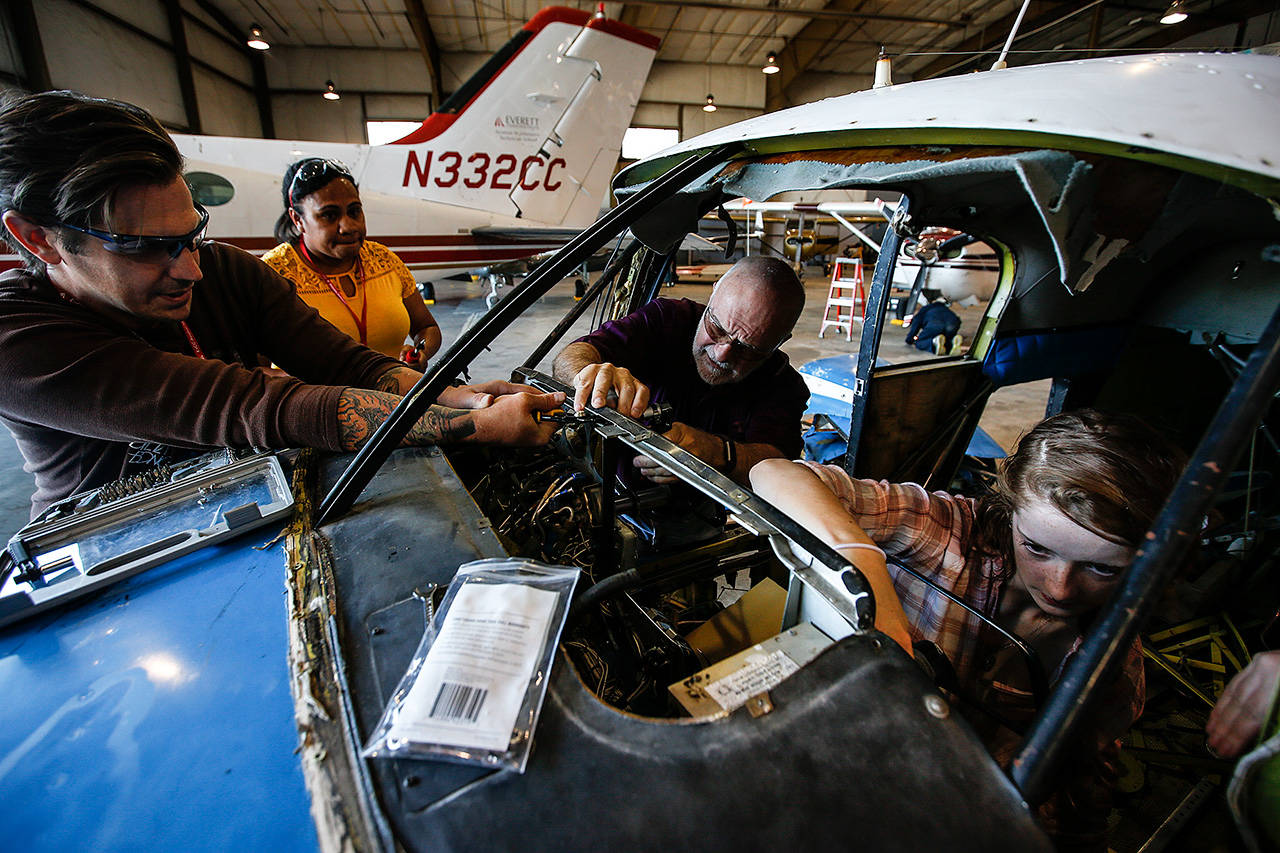EVERETT — Are we sending a message to girls and women that they shouldn’t get their hands dirty?
If so, we may be cheating them out of thousands of high-paying jobs and hundreds of thousands of dollars.
It’s a question educators at Everett Community College and local school districts are asking.
Regionally, the median salary — half make more and half make less — for aviation mechanics is $70,620, according to the Washington State Employment Security Department.
But it’s not uncommon for mechanics to earn $100,000 or more, said Rob Prosch, interim Dean of Aerospace and Advanced Manufacturing Careers at EvCC.
“Our young women are not aware this job exists and the salaries they can make,” Prosch said.
It takes plenty of people on the ground to keep the airplanes aloft, and there’s a nationwide shortage of aircraft mechanics.
“If we’re telling young men you can do this, but not telling our young women you can do this, we’re failing them,” said Prosch.
There may be no better place to pose the question. Nearly half of the state’s aerospace jobs are located in Snohomish County— so where are the women?
Less than 3% of the aviation maintenance industry is female, Prosch said.
Now with the help of a federal grant, Prosch and others hope to identify and knock down the barriers that are leaving girls and women on the sidelines.
EvCC will receive a three-year $412,000 grant from the National Science Foundation to boost the number of women in aerospace technician programs.
The college will partner with the Everett, Marysville and Mukilteo school districts. On the industry side, Boeing, Delta Air Lines and Glasair Aviation in Arlington will join in.
Participating schools hope to see a 30% increase in female student enrollment in aerospace career and technical classes at EvCC at the end of three years.
Most of the grant money will support professional development for middle and high school teachers, community college faculty and career counselors.
“We want to ensure that the teaching methods that we’re using at all levels is inclusive of women and young men of color,” Prosch said.
Young women and young men of color will be recruited to participate in STEM opportunities and invited to learn more about aviation maintenance and technologies.
Ana Naulivou is one of a handful of female students at EvCC’s Aviation Maintenance Technology program, a two-year program.
She also works full-time at Boeing. The aerospace company is paying her tuition — a perk some employers offer, Prosch said.
“My dad wanted me to be a pilot. But I always wanted to know how things fly — even butterflies,” said Naulivou, a second-year student.
In 2017, she was one of the first of 10 students to enroll in a new avionics program at EvCC. Avionic students learn to repair and maintain an aircraft’s electronic systems.
Here and there, though, Naulivou has had to stand her ground.
“I tell the guys — you know the reality is we’re all human. We have two arms and two legs. Why shouldn’t women have the opportunity to do this job?” Naulivou said.
“When I talk to parents and girls and tell them this is what I do — they get excited. They realize there’s a world for women in aviation.”
Getting more young women and students of color interested in the aerospace industry means working directly with middle and high school students and teachers, along with people who have an impact outside of the classroom — parents, mentors, career and guidance counselors, Prosch said.
“Anecdotally, I think there’s a message we send to young women,” said Prosch. “You belong in health care or you belong in teaching. Aviation mechanics? Oh, you don’t want to get dirty doing that.”
“The young women that are in our program love to get their hands dirty. They’re just go-getters and know exactly what they want,” Prosch said. Graduates of the two-year program are scooped up by local aerospace companies with the potential to earn six-figure salaries.
Last year, the aviation maintenance program doubled its student capacity when it added an evening session.
Female enrollment has increased in the past two to three years. The 2016 entering class didn’t have any female students. This fall there are eight.
“We’re working toward having greater numbers in the program,” said Gwen Holt, program coordinator for aviation. Seventeen (14 percent) of the school’s 118 students are women.
Greater outreach has been key to attracting more female students, Holt said, especially since aviation maintenance is one of the aerospace industry’s hidden occupations.
The mechanics who tend to the plane when it’s on the ground aren’t as visible as the pilots, Prosch said.
The number of people needed to perform aircraft inspections, routine maintenance and repairs is outpacing the number of students in aviation maintenance programs.
The nation’s aerospace industry is facing a shortage of skilled workers, and by extension, the state’s and county’s aerospace industry.
Between 2021 and 2026, job openings in the state’s aerospace sector are expected to surpass 6,000 per year, but nearly half of those, 2,700 are expected to go unfilled each year, according to a study by Community Attributes Inc. in Seattle.
In short, the aerospace industry can’t hope to fill those jobs without bringing women and other underrepresented workers to the table.
“The only way we can come close to filling that is increasing the number of women,” Prosch said.
Janice Podsada; jpodsada@heraldnet.com; 425-339-3097; Twitter: JanicePods
EvCC’s Aviation maintenance and advanced avionics programs offer certificates and associate degrees. For more information, visit EverettCC.edu/Aviation
Talk to us
> Give us your news tips.
> Send us a letter to the editor.
> More Herald contact information.

























